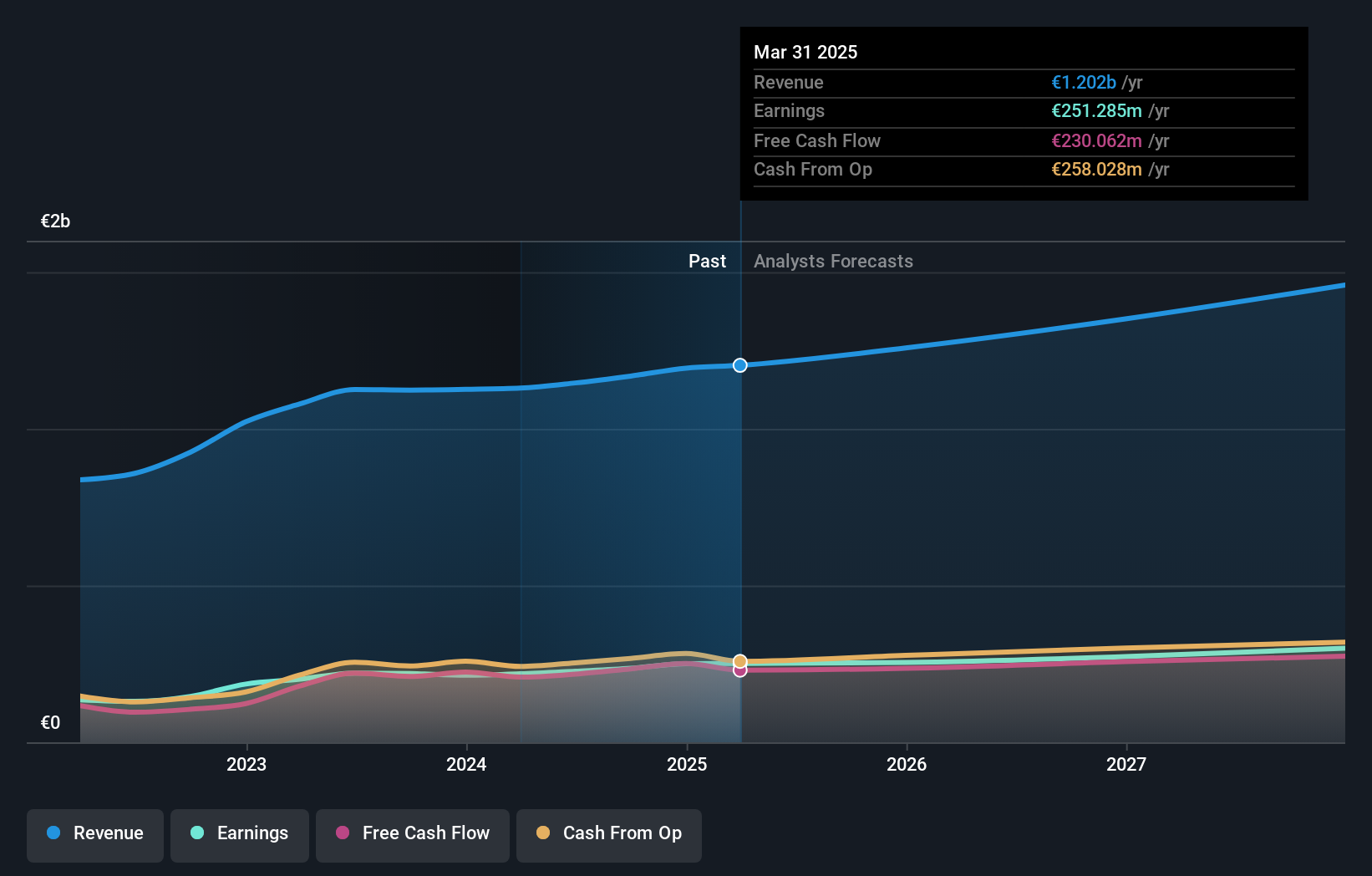Individual investors own 29% of RATIONAL Aktiengesellschaft (ETR:RAA) shares but private companies control 32% of the company
Key Insights
- Significant control over RATIONAL by private companies implies that the general public has more power to influence management and governance-related decisions
- The top 3 shareholders own 52% of the company
- Insiders own 16% of RATIONAL
A look at the shareholders of RATIONAL Aktiengesellschaft (ETR:RAA) can tell us which group is most powerful. We can see that private companies own the lion's share in the company with 32% ownership. In other words, the group stands to gain the most (or lose the most) from their investment into the company.
Individual investors, on the other hand, account for 29% of the company's stockholders.
Let's delve deeper into each type of owner of RATIONAL, beginning with the chart below.
View our latest analysis for RATIONAL

What Does The Institutional Ownership Tell Us About RATIONAL?
Institutions typically measure themselves against a benchmark when reporting to their own investors, so they often become more enthusiastic about a stock once it's included in a major index. We would expect most companies to have some institutions on the register, especially if they are growing.
We can see that RATIONAL does have institutional investors; and they hold a good portion of the company's stock. This implies the analysts working for those institutions have looked at the stock and they like it. But just like anyone else, they could be wrong. If multiple institutions change their view on a stock at the same time, you could see the share price drop fast. It's therefore worth looking at RATIONAL's earnings history below. Of course, the future is what really matters.

We note that hedge funds don't have a meaningful investment in RATIONAL. The company's largest shareholder is Estate Of Siegfried Meister, with ownership of 32%. Meanwhile, the second and third largest shareholders, hold 16% and 4.4%, of the shares outstanding, respectively.
To make our study more interesting, we found that the top 3 shareholders have a majority ownership in the company, meaning that they are powerful enough to influence the decisions of the company.
While studying institutional ownership for a company can add value to your research, it is also a good practice to research analyst recommendations to get a deeper understand of a stock's expected performance. Quite a few analysts cover the stock, so you could look into forecast growth quite easily.
Insider Ownership Of RATIONAL
The definition of an insider can differ slightly between different countries, but members of the board of directors always count. Management ultimately answers to the board. However, it is not uncommon for managers to be executive board members, especially if they are a founder or the CEO.
I generally consider insider ownership to be a good thing. However, on some occasions it makes it more difficult for other shareholders to hold the board accountable for decisions.
It seems insiders own a significant proportion of RATIONAL Aktiengesellschaft. Insiders own €1.3b worth of shares in the €7.9b company. That's quite meaningful. Most would say this shows a good degree of alignment with shareholders, especially in a company of this size. You can click here to see if those insiders have been buying or selling.
General Public Ownership
The general public-- including retail investors -- own 29% stake in the company, and hence can't easily be ignored. While this size of ownership may not be enough to sway a policy decision in their favour, they can still make a collective impact on company policies.
Private Company Ownership
We can see that Private Companies own 32%, of the shares on issue. It might be worth looking deeper into this. If related parties, such as insiders, have an interest in one of these private companies, that should be disclosed in the annual report. Private companies may also have a strategic interest in the company.
Next Steps:
It's always worth thinking about the different groups who own shares in a company. But to understand RATIONAL better, we need to consider many other factors. Take risks for example - RATIONAL has 1 warning sign we think you should be aware of.
But ultimately it is the future, not the past, that will determine how well the owners of this business will do. Therefore we think it advisable to take a look at this free report showing whether analysts are predicting a brighter future.
NB: Figures in this article are calculated using data from the last twelve months, which refer to the 12-month period ending on the last date of the month the financial statement is dated. This may not be consistent with full year annual report figures.
New: AI Stock Screener & Alerts
Our new AI Stock Screener scans the market every day to uncover opportunities.
• Dividend Powerhouses (3%+ Yield)
• Undervalued Small Caps with Insider Buying
• High growth Tech and AI Companies
Or build your own from over 50 metrics.
Have feedback on this article? Concerned about the content? Get in touch with us directly. Alternatively, email editorial-team (at) simplywallst.com.
This article by Simply Wall St is general in nature. We provide commentary based on historical data and analyst forecasts only using an unbiased methodology and our articles are not intended to be financial advice. It does not constitute a recommendation to buy or sell any stock, and does not take account of your objectives, or your financial situation. We aim to bring you long-term focused analysis driven by fundamental data. Note that our analysis may not factor in the latest price-sensitive company announcements or qualitative material. Simply Wall St has no position in any stocks mentioned.
About XTRA:RAA
RATIONAL
Engages in the development, production, and sale of professional cooking systems for industrial kitchens in Germany, rest of Europe, North America, Latin America, Asia, Australia, New Zealand, the Middle East, and Africa.
Flawless balance sheet with solid track record and pays a dividend.
Similar Companies
Market Insights
Community Narratives



